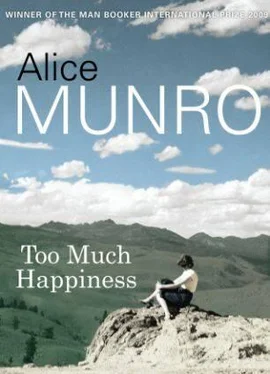As she had expected, there was deeper and deeper snow outside the train windows as they travelled east. This was a second-class train, quite spartan in comparison with the train she had taken from Cannes. There was no dining car, but cold buns-some filled with various spicy sausages-were available from the tea wagon. She bought a cheese-filled bun half the size of a boot and thought she would never finish it, but in time she did. Then she got out her little volume of Heine, to assist in bringing the German language to the surface of her mind.
Every time she lifted her eyes to the window it seemed that the snow fell more thickly, and sometimes the train slowed, almost stopping. They would be lucky at this rate to reach Berlin by midnight. She wished that she had not let herself be talked out of going to a hotel, instead of to the house on Potsdam Street.
“It will do poor Karl so much good just to have you for one night under the same roof. He still thinks of you as the little girl on our doorstep, even though he gives great credit to your achievements and takes pride in your great success.”
It was in fact after midnight when she rang the bell. Clara came, in her wrapper, having sent the servant to bed. Her brother-she said this in a half whisper-had been wakened by the noise of the cab and Elisa had gone to settle him down and to assure him that he would see Sophia in the morning.
The word “settle” sounded ominous to Sophia. The sisters’ letters had mentioned nothing but a certain fatigue. And Weierstrass’s own letters had held no personal news, being full of Poincaré and his-Weierstrass’s-duty to mathematics in making matters clear to the king of Sweden.
Now hearing the old woman’s voice take that little pious or fearful drop as she mentioned her brother, now smelling the once-familiar and reassuring but tonight faintly stale and dreary odors of that house, Sophia felt that teasing was not perhaps so much in order as it used to be, that she herself had brought not only the cold fresh air, but some bustle of success, an edge of energy, of which she had been quite unaware, and which might be a little daunting and disturbing. She who used to be welcomed with hugs and robust pleasure (one of the surprises about the sisters was how jolly they could be yet how conventional) was still hugged, but with tears standing in faded eyes, with old arms trembling.
But there was warm water in the jug in her room, there was bread and butter on her night table.
As she undressed she could hear faintly agitated whispering out in the upper hall. It might have been about their brother’s state or about herself or about the absence of a cover on the bread and butter, which maybe had not been noticed until Clara ushered her into her room.
When she worked with Weierstrass, Sophia had lived in a small dark apartment, most of the time with her friend Julia, who was studying chemistry. They did not go to concerts or plays-they had limited funds and were absorbed by their work. Julia did go out to a private laboratory where she had obtained privileges hard for a woman to get. Sophia spent day after day at her writing table, not rising from her chair sometimes till the lamp had to be lit. Then she would stretch and walk, quickly, quickly, from one end of the apartment to the other-a short enough distance-sometimes breaking into a run and talking aloud, bursting into nonsense, so that anybody who did not know her as well as Julia did would wonder if she was sane.
Weierstrass’s thoughts, and now hers, were concerned with elliptic and Abelian functions, and the theory of analytic functions based on their representation as an infinite series. The theory named for him contended that every bounded infinite sequence of real numbers has a convergent subsequence. In this she followed him and later challenged him and even for a time jumped ahead of him, so that they progressed from being teacher and pupil to being fellow mathematicians, she being often the catalyst to his investigations. But this relationship took time to develop, and at the Sunday suppers-to which she was invited readily because he had given up his Sunday afternoons to her-she was like a young relation, an eager protégée.
When Julia came she was invited as well, and the two girls were fed roast meat and creamed potatoes and light delectable puddings that upset all the ideas that they had about German cooking. After the meal they sat by the fire and heard Elisa read aloud. She read with great spirit and expression from the stories of the Swiss writer Conrad Ferdinand Meyer. Literature was the weekly treat, after all the knitting and mending.
At Christmas there was a tree for Sophia and Julia, though the Weierstrasses themselves had not bothered about one for years. There were bonbons wrapped in glittery paper, and fruitcake and roast apples. As they said, for the children.
But there came before long a disturbing surprise.
The surprise was that Sophia, who seemed the very image of a shy and inexperienced young girl, should have a husband. In the first few weeks of her lessons, before Julia arrived, she had been picked up at their door, on Sunday nights, by a young man who was not introduced to the Weierstrass family and was taken to be a servant. He was tall and unattractive, with a thin red beard, a large nose, untidy clothes. In fact, if the Weierstrasses had been more worldly, they would have realized that no self-respecting noble family-which they knew Sophia’s to be-would have such an unkempt servant, and that therefore he must be a friend.
Then Julia came, and the young man disappeared.
It was some time later that Sophia released the information that he was named Vladimir Kovalevsky and that she was married to him. He was studying in Vienna and Paris though he already had a law degree and had been trying to make his way in Russia as a publisher of textbooks. He was several years older than Sophia.
Almost as surprising as this news was the fact that Sophia gave it out to Weierstrass and not to the sisters. In the household they were the ones who had some dealings with life-if only in the lives of their servants and the reading of fairly up-to-date fiction. But Sophia had not been a favorite with her mother or her governess. Her negotiations with the General had not always been successful but she respected him and thought that perhaps he respected her. So it was to the man of the house that she turned with an important confidence.
She realized that Weierstrass must have been embarrassed-not when she was talking to him but when he had to tell his sisters. For there was more to it than the fact that Sophia was married. She was well and legally married, but it was a White Marriage-a thing he had never heard of, nor the sisters either. Husband and wife not only did not live in the same place, they did not live together at all. They did not marry for the universally accepted reasons but were bound by their secret vow never to live in that way, never to-
“Consummate?” Perhaps it would be Clara who said this. Briskly, even impatiently, to get the moment over with.
Yes. And young people-young women-who wanted to study abroad were compelled to go through with this deception because no Russian woman who was unmarried could leave the country without her parents’ consent. Julia’s parents were enlightened enough to let her go, but not Sophia’s.
What a barbarous law.
Yes. Russian. But some young women found their way around this with the help of young men who were very idealistic and sympathetic. Perhaps they were anarchists as well. Who knows?
It was Sophia’s older sister who had located one of these young men, and she and a friend of hers set up a meeting with him. Their reasons were perhaps political, rather than intellectual. God knows why they took Sophia along-she had no passion for politics and did not think herself ready for any such venture. But the young man looked over the two older girls-the sister named Aniuta however businesslike could not disguise her beauty-and he said no. No, I do not wish to go through with this contract with either of you estimable young ladies, but I would agree to do so with your younger sister.
Читать дальше












